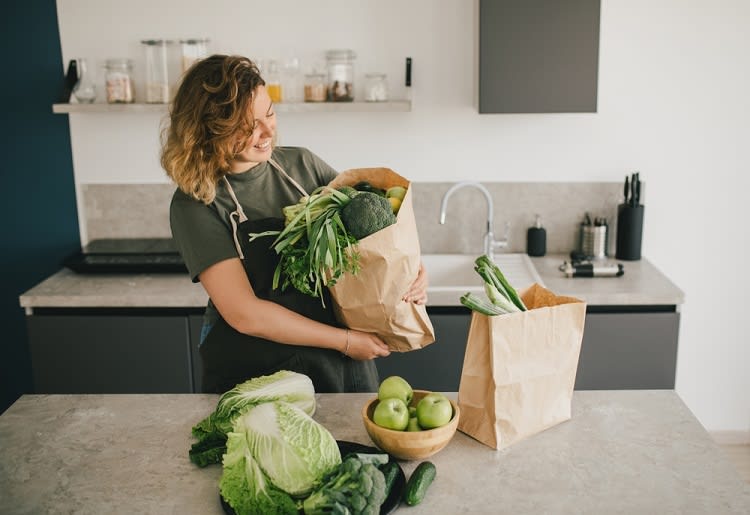Whether you order out or cook at home using meal planning apps, you can get adequate nutrients on a vegan diet. Proper meal prep that includes a large variety of plant foods helps ensure that vegans get sufficient nutrients from their daily food intake.
Here are the top 10 nutrients that vegans might be lacking and the best ways to incorporate them into a vegan diet.
1. Vitamin B12
Also known as cobalamin, vitamin B12 is a water-soluble nutrient found in most animal-based foods such as fish, meat, eggs, and milk.
Vegans can obtain vitamin D by consuming nutritional yeast, plant milk, fortified breakfast cereals, and soy products. If that is inadequate, then taking a B12 supplement works as well.
Vitamin B12 is important for the body to produce healthy blood and nerve cells, prevent anemia, and maintain proper brain functions.
The amount of B12 the body requires per day depends on age. The National Institutes of Health (NIH) recommends 2.4 mcg for teens and adults and 2.6-2.8 mcg for pregnant or lactating women (1).
2. Vitamin D
Nicknamed the "sunshine vitamin," this fat-soluble nutrient is best obtained through exposure to the sun. It is vital for the body as it helps with calcium absorption and is required to maintain bone health and muscle strength. It also boosts immunity.
There are two types of vitamin D: D2 and D3. While vegans can get D2 from mushrooms, consuming fortified products such as plant milk, orange juice, and cereals can provide vitamin D easily. People with low sunlight exposure can also consider vitamin D3 supplementation from lichen, a fungal-algae organism that is perfectly vegan-friendly.
The vitamin D requirement for children above the age of 1 and adults below the age of 70, including pregnant and lactating women, is 15 mcg. Adults above 70 may require 20 mcg daily for optimized health.
3. Calcium
Calcium is a mineral that is most abundant in the human body. Our body needs calcium to maintain good bones and teeth, aid muscle contractions, and regulate heart and nerve functions.
For vegans, excellent sources include broccoli, kale, cabbage, beans, chickpeas, and soy foods. Calcium-fortified foods such as orange juice and flour are also great options.
The Recommended Daily Allowance (RDA) for calcium ranges between 700-1,300 mg for children between 1 and 18 years and between 1,000-1,300 mg for adults, including pregnant, lactating women and people above 70 (3).

4. Protein
Proteins serve as the building blocks of the body as they are an important source of amino acids. They are vital for cell and tissue growth, strong muscles, digestion, and enhancing immune functions.
A variety of plant proteins such as grains, legumes, nuts, and seeds can satisfy protein needs easily. Eating quinoa, buckwheat, edamame, chia seeds, and tofu regularly can be ideal for vegans.
The Daily Reference Intake (DRI) for protein per day is 13-19 g for children 1-8 years, 34-52 g for younger males, and 56 g for adult males. While females of 9-13 years need 34 g, those above 14 years require 46 g per day.
Eating the right amount of protein—or any of these other nutrients—every day can be challenging. Luckily, there are many great meal delivery services to make things a little bit easier. Home Chef and Hello Fresh - both offering vegan meal plans - minimize your cooking effort and food waste so you can whip up a chef-designed meal to enjoy with your friends and family, irrespective of your cooking skills.
5. Omega-3 Fatty Acids
Omega-3s refer to fatty acids that are components of complex lipids (fats). The 3 types of omega-3s are docosahexeanoic acid (DHA), eicosapentaenoic acid (EPA), and alphalinolenic acid (ALA).
The body converts ALA into EPA and DHA but in small quantities. The RDA for DHA and EPA is not established. ALA requirements vary between 1-1.6 g depending on age, with males requiring more than females.
Plant sources of ALA are leafy green vegetables, seeds such as flax seeds, chia, quinoa, and hemp, and seed oils from flaxseed, canola, soybeans, and walnuts.
Marine microalga is a vegan source of DHA and EPA, and its supplement intake can provide good concentrations of omega-3s.
6. Vitamin A
This fat-soluble vitamin plays a major role in boosting the immune system, enhancing vision, and promoting growth and reproduction. Vegans can get provitamin A carotenoids from plants such as leafy greens, carrots, sweet potatoes, butternut squash, red pepper, melon, mango, and papaya.
While the RDA for adult males is 900 mcg, females normally need 700 mcg, but this increases to around 1,300 mcg when breastfeeding (3).
7. Zinc
Zinc is an essential trace mineral that is required in small amounts. It plays an active role in creating DNA, promoting cell growth, protein building, and immunity.
Vegan sources of zinc include beans, lentils, pumpkin seeds, leafy greens, avocados, oats, Brazil nuts, pecans, and tofu. For adults, the RDA for zinc is 8 mg for women and 11 mg for men, with pregnant and lactating women requiring slightly more (4).

8. Iron
Iron is a mineral required to produce healthy blood cells. It helps them carry oxygen throughout the body and supports good brain functions.
Iron is of two types: haem iron and non-haem iron. Vegans can obtain non-haem iron from plant foods such as leafy greens, beans, lentils, whole grains, seeds, nuts, and tofu. Combining these with vitamin C-rich foods can help increase iron absorption. Non-haem iron is harder for the body to absorb, so vegans should consume more of it.
Daily iron intake is established at 8 mg for adult men and 18 mg for adult women, with requirements escalating to 27 mg during pregnancy.
9. Iodine
Iodine is a trace element that has to be obtained from daily diets. The thyroid gland in the body uses iodine to produce thyroid hormones that aid healthy metabolism, growth, and development during pregnancy and infancy.
The RDA for iodine in adults is 150 mcg, with the pregnant and breastfeeding populations requiring between 220-290 mcg.
The best vegan sources of iodine are prunes, strawberries, green beans, potatoes, iodized salt, and watercress. Seaweeds such as kombu kelp, nori, and sea lettuce are also great sources of iodine.
10. Creatine
Creatine is an organic acid produced in the body. Though not essential, it can provide strength, endurance, and energy for muscles, especially in athletes.
Available only in animal foods, exogenous supplements are the best way to bridge creatine deficiencies and boost brain functioning in vegans and vegetarians (5).

Conclusion
Following a vegan lifestyle is easy as long as you put in the right efforts to gain adequate nutrients from plant sources. Consuming a wide variety of raw fruits, vegetables, protein powders, and other food sources is healthier and safer than supplements, and even teaches you how to reduce food waste.
Vegans should opt for a balanced diet to optimize nutrient intake for the best health benefits. Choosing a good vegan meal delivery service is important if you have limited time to find the right foods or are the type to eat out.

